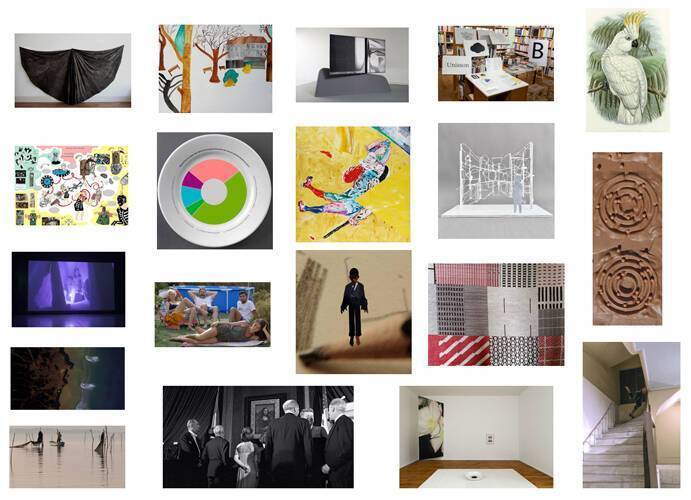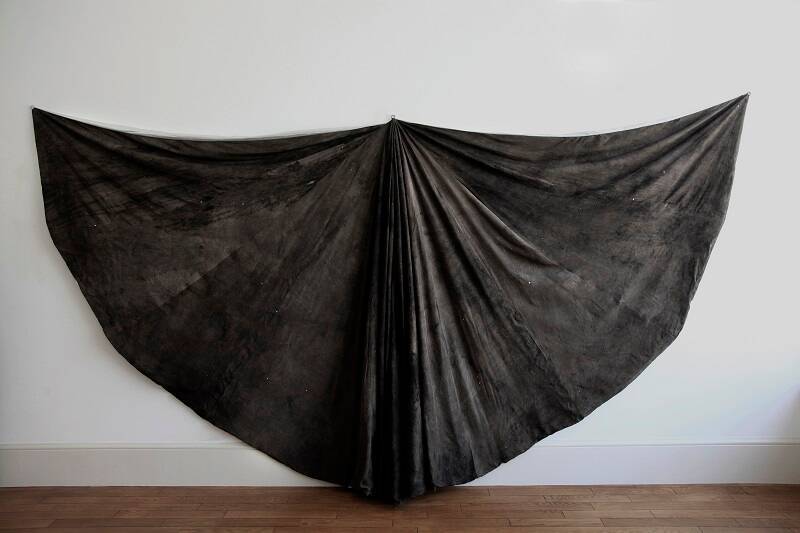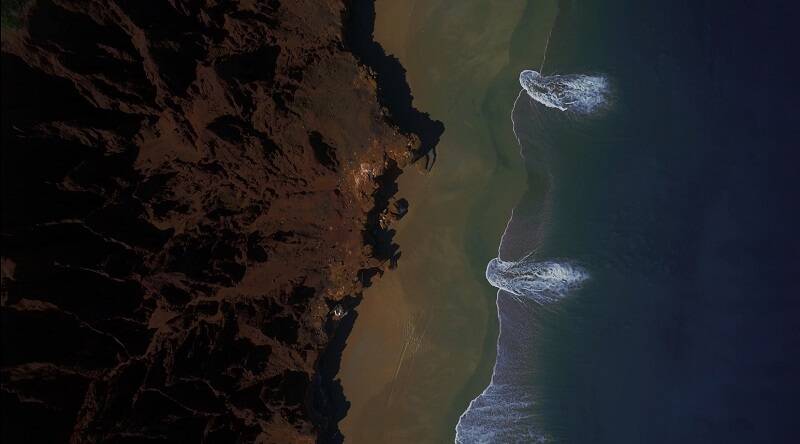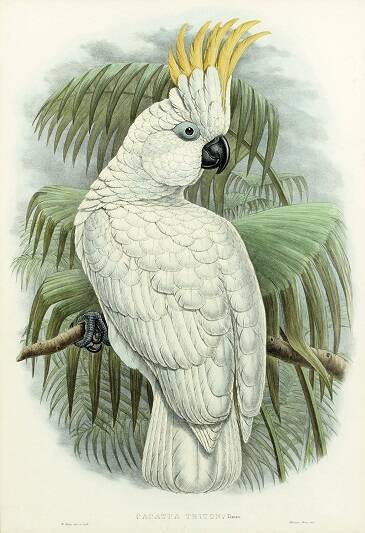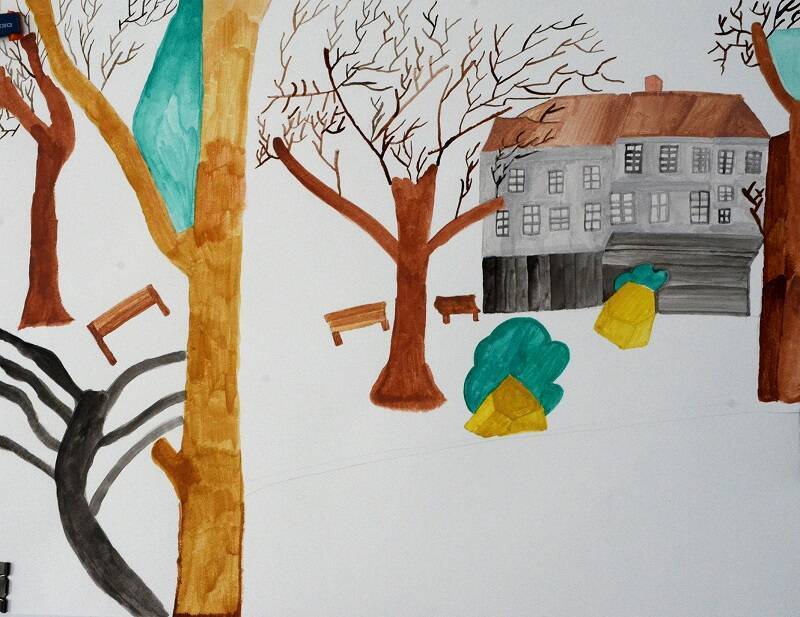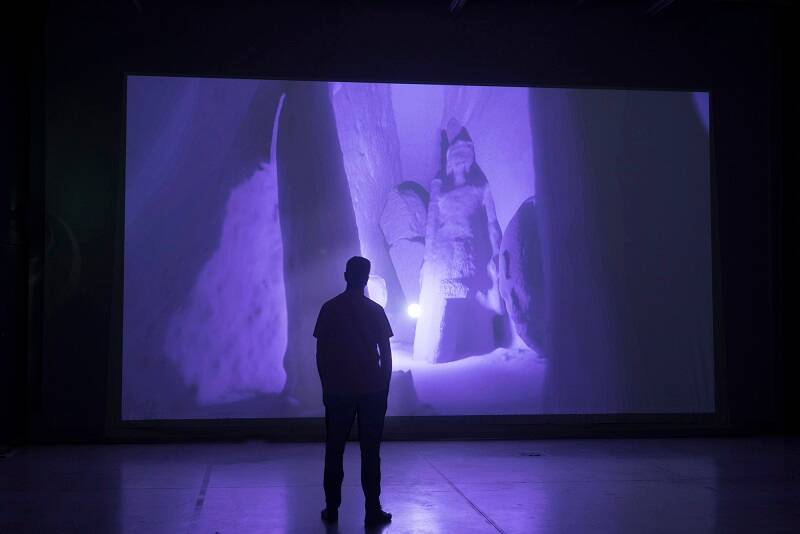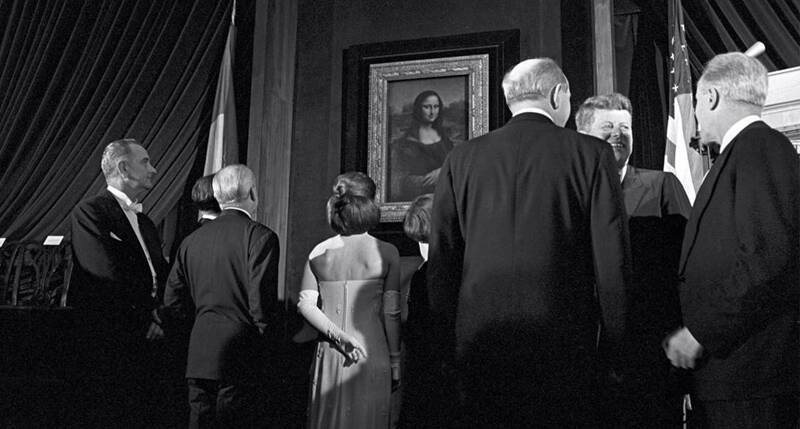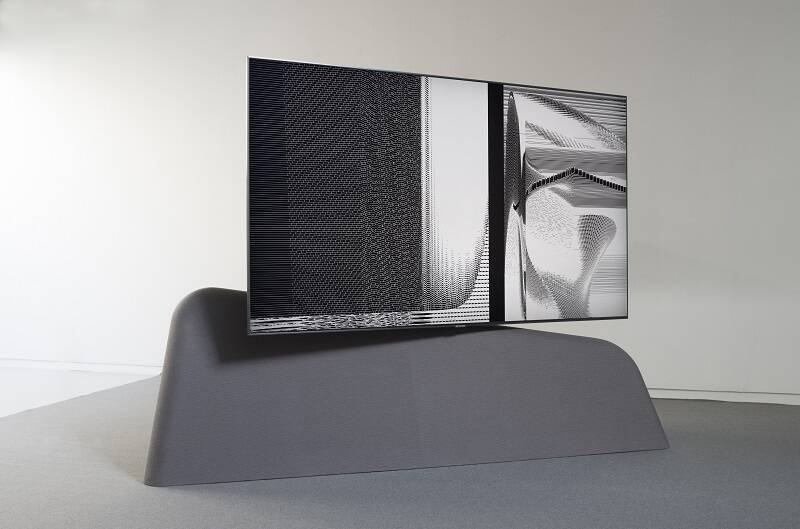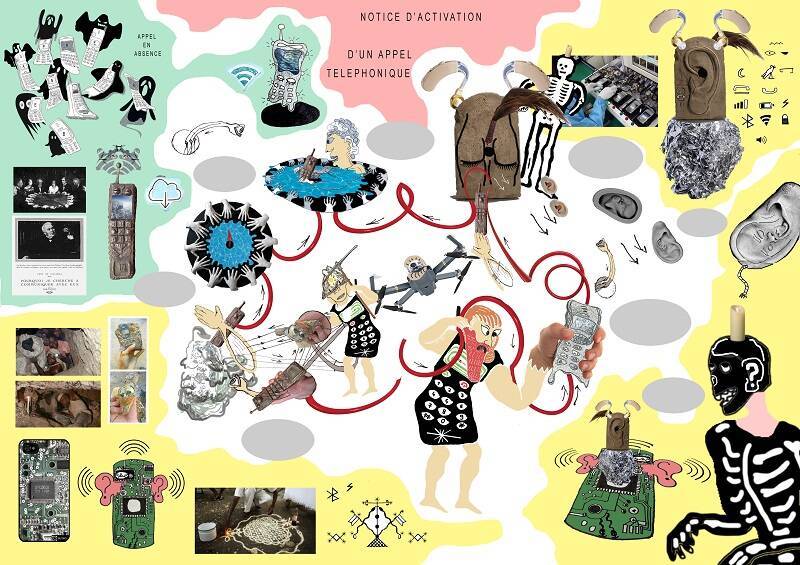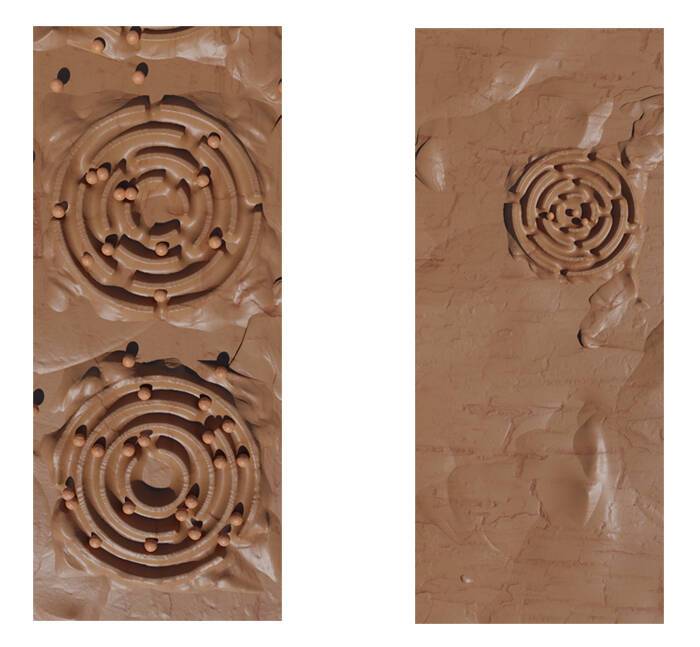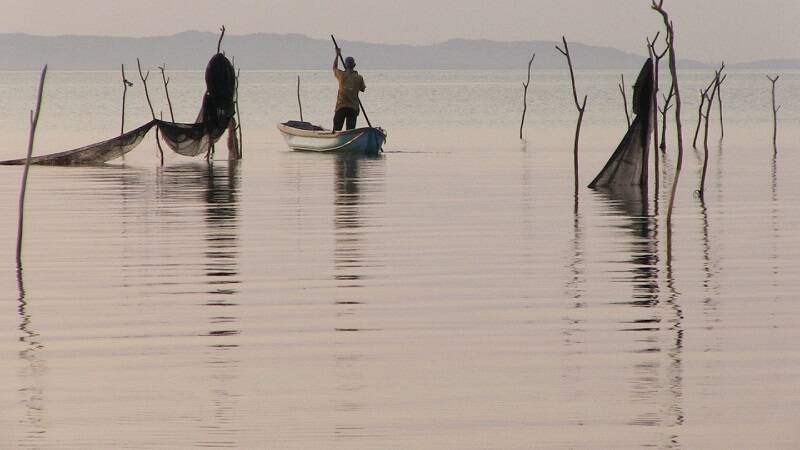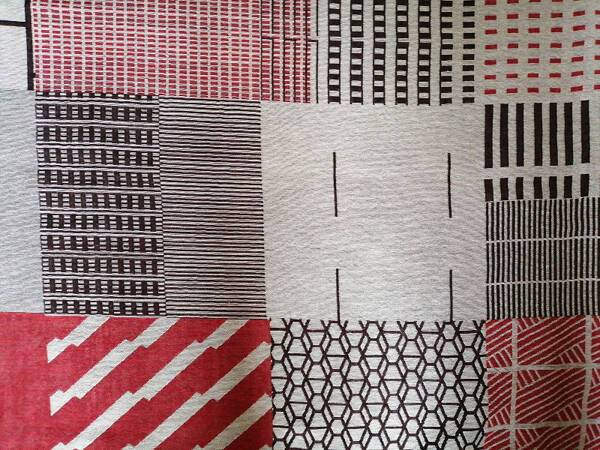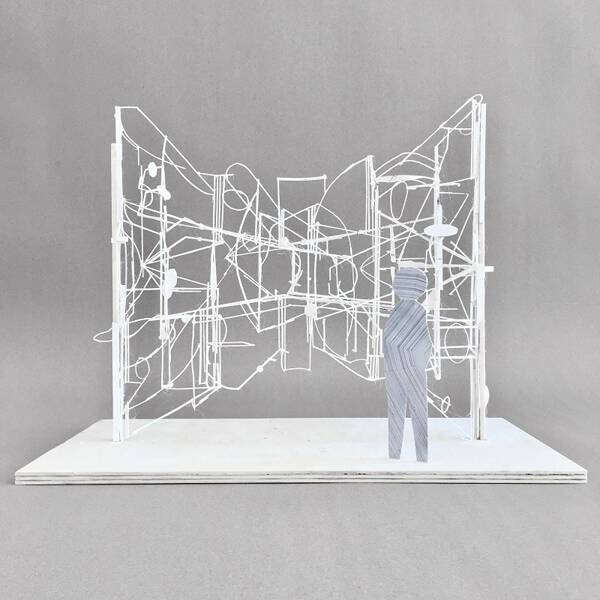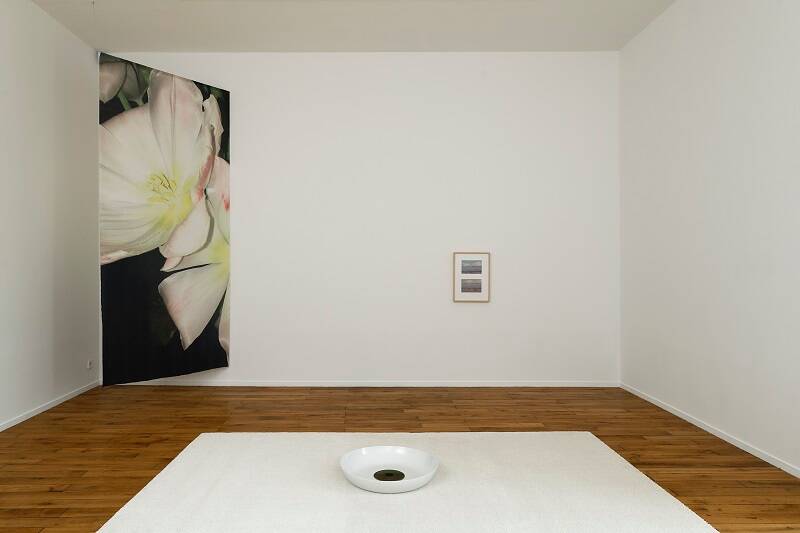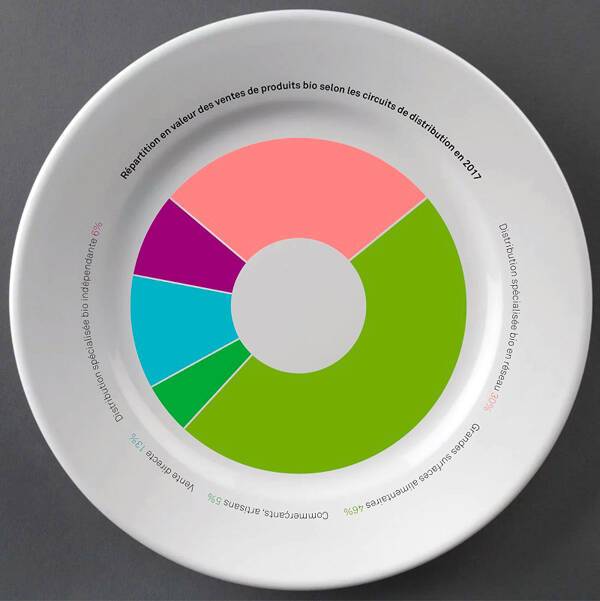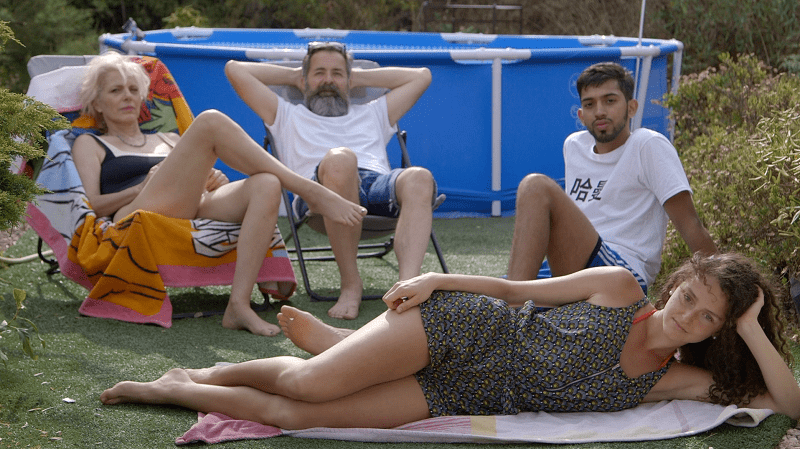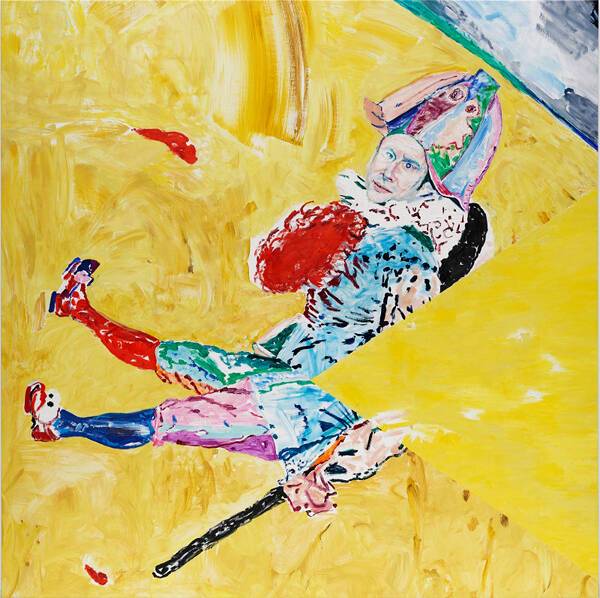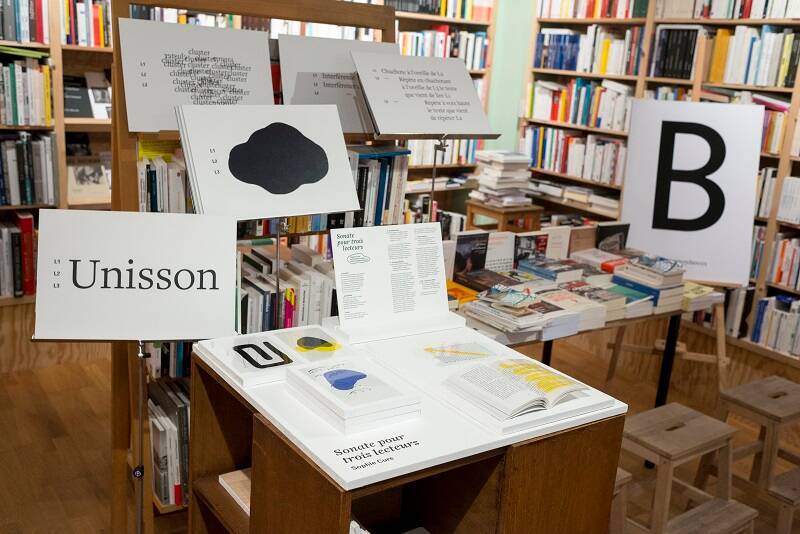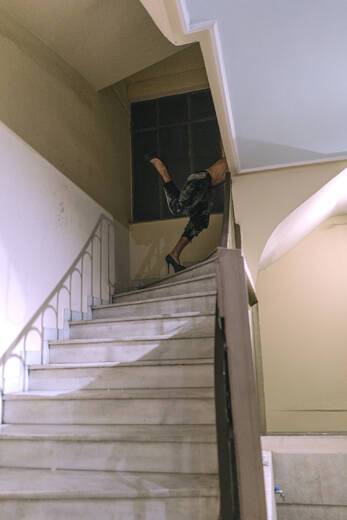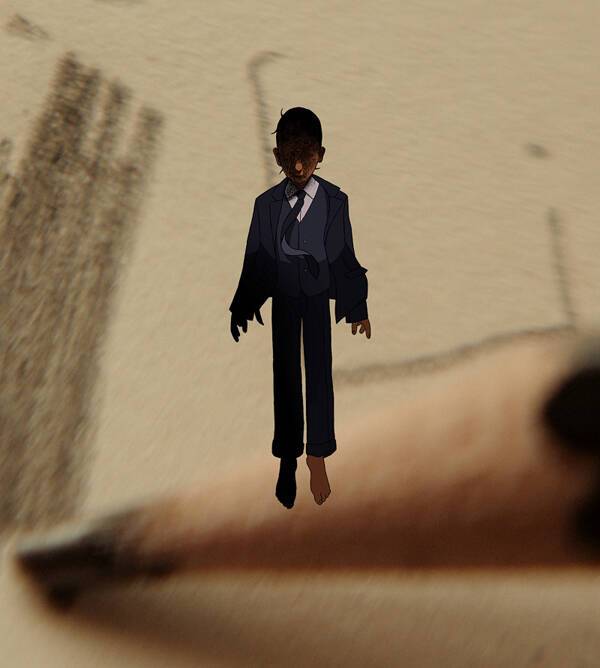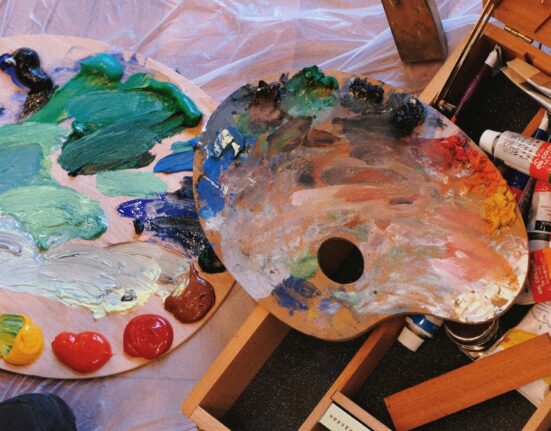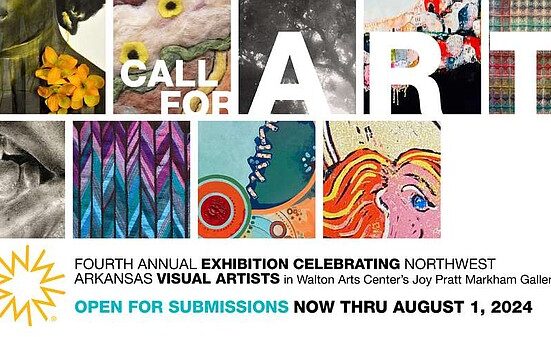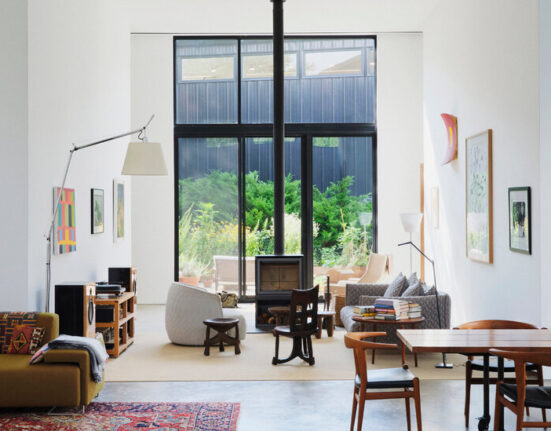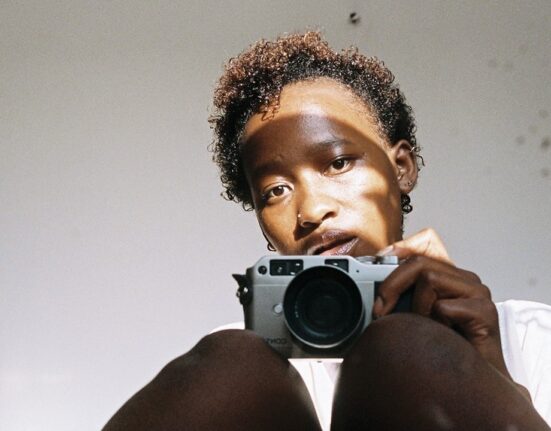Panorama of the works presented
Rapporteurs for the 2019 Commission
- Émilie Robert, PhD student and lecturer
- Leo Guy-Denarcy, art critic and curator
Adelaide Feriot At the turn of the ellipse
© Gerald Petit
This work is articulated between performance and plastic work. It is a research project that the artist leads to collect the first representations of the sky made by man. This new production is an opportunity for the artist to give shape to new fields of formal and aesthetic development… Read more
@ Angelika Markul Marella
© Angelika Markul
Marella is at the heart of more than a year of research into the discovery of Cretaceous footprints in the Waldamany region of Australia by archaeologist Steven Salisbury. This research identified 21 different types of fingerprints dating back 140 million years… Read more
Angelique Buisson Tito’s Parrot
The notion of transmission is at the heart of Angélique Buisson’s practice. A common thread in his work, his multiplicity is rooted in a history governed by the inevitable pitfall of his interpretation and distortion.
Whether it invokes the memory of the prehistoric woman Magda (My name is then Magda, 2018) or brings together members of the Veterans Affairs Association (ULAAVCG), the young people of the Second Regiment of Voluntary Military Service and the teenagers attending the Youth Service of the City of Brétigny-sur-Orge (Double Brief, 2018), the artist questions the variability of views regarding a common past…Read more
© Angélique Buisson
Antoine Yoseph The plain of images
© Antoine Yoseph
Antoine Yoseph’s work responds to what he calls “methodology of the survey”. In his work, photography is as much a recording tool for documentary purposes as a means of producing forms with their own plastic qualities. As in all of its achievements, its project depends on a double condition aiming to capture and immortalize a place in strong mutation, as well as to generate multiple plastic formulations. Entitled La Plaine des images, this proposal comes from the workshop he has been running since 2012 in the neighbourhood house of Plaine Saint-Denis where he photographs the immediate urban environment. These photographs are then used as resources to paint the various participants… Read more
Arash Nassiri Darwin Darwah (sound)
© Arah Nassiri
The sound work Darwin Darwah (sound) proposed by Arash Nassiri is built in echo with the video Darwin Darwah stereoscopic 3D tour in Paris in 2018. This approach aims to make possible an analysis of the roots of disinformation, particularly in the texture and use of sound mediums… Read more
Chrystèle Nicot (in collaboration with Antoine Alesandrini) SPACE SLASHER
© Photo by Schulmann-Sachs/picture alliance via Getty Images
Chrystèle Nicot’s work is rooted in the visual aesthetics of film and television history. The artist draws on this in the stereotypes of the collective imagination built by the popular spectacle and its multiple fictions. Chrystèle Nicot’s works find two particular echoes in our contemporaneity… Read more
Claire Malrieux, Dream Bank
© Claire Malrieux
Claire Malrieux considers drawing as an ecosystem whose balance would not only be visual but also structural. Gathered under the name ofHyperdrawing, its various productions consist of constantly expanding and changing graphics, reflecting the world around us. In 2017, General climate (notably exhibited at the Collège des Bernardins in Paris and in the Hyperpavilion of the Venice Biennale) thus related the evolution of the Anthropocene through a drawing built in real time according to the daily and variable data recorded on different climate monitoring sites; thus influencing the algorithms in the realization of the work… Read more
Elsa Fauconnet Research for the project Appel en absence/ Forget me
© Elsa Fauconnet
Elsa Fauconnet stages worlds fantasized by humanity in need of meaning and this through video, engraving, drawing, or sculpture. Appel en absence, the artist’s latest ongoing project, represents the stages of a telephone communication with the features, in his own words, “of an elusive transit space” and which would take possession of the bodies to recompose light signals… Read more
Adrien Cruellas and Florian Sumi Warum, The Labyrinth, 2020 Preparatory views of the film WARUM. Why?
© Adrien Cruellas and Florian Sumi
Why? From utilitarian to existential, from trivial to metaphysical, such a question covers the endless palette of human questions. Necessarily incomplete, it is only a reflection of our insatiable need for understanding of our condition, its cause and its purpose. During their live show Computers (2018), the company of Florian Sumi and Adrian Cruellas is part of the line of questions relating to dialogues between man and machine… Read more
François Daireaux Isidro Guerra
© François Daireaux, 2019
François Daireaux is an artist of movement. He practices his art in displacement and in the encounter with the other. Isodoro Guerra, the artist’s latest project, takes root in a study trip to Mexico in 2015. The artist met the sinner Isodoro Guerra in a Zapotheque village in the Tehuantepec region… Read more
Jennifer Caubet Given a space A and a Time Z (work in progress)
© Jennifer Caubet
Jennifer Caubet’s project, Étant donné un espace A et un temps Z, is part of the filiation of several works by the artist that relate to cartography and topography. As Sarah Ihler-Meyer explains, “Jennifer Caubet appropriates layers, that is to say states of things already configured and identified”. The artist puts into perspective several situations allowing him to build as many scenarios of a map… Read more
Keita Mori Gate
GATE (scale model 1/10), 2019 paper, wood 32 x 36 x 6 cm © ADAGP Keita Mori Photo. Rebecca Fanuele Courtesy the artist and Galerie Catherine Putman, Paris
In the digital age, Keita Mori defends bug culture as a law governing the realization of his work. Known for his meticulous thread collages (Bug Reports), he focuses on manual work: an eminently human and inevitably imperfect characteristic. Modeled on the computer model, malfunctions and errors are used to build complex architectures with impossible uses. Real environments, its achievements simultaneously appeal to science fiction and religious worship… Read more
Laëtitia Badaut-Haussmann
© Laëtitia Badaut-Haussmann
Laëtitia Badaut-Haussmann’s productions reveal the stakes of modern domesticity. Questioning the very act of living in our time, the artist creates many environments and installations whose forms, materials and symbols are characteristic or even symptomatic of our way of living. Among them, ceramics and the eye are the essential references. Whether it concerns ancestral practices or advanced industry, the use of ceramics in its tiled modules allows the synthesis of potentialities, prerogatives and actions of everyday life: sleep, sit or read, in the voluntary absence of what might be akin to beds, benches or tables… Read more
Laurent Sfar with Jérôme Dupeyrat and Sandra Foltz Table tops, preparatory version for a tablecloth and a plate service (detaills), 2020
© Laurent Sfar
Less in representation than in suggestion, Laurent Sfar proposes a poetry of amalgams, sometimes funny and impromptus; describing himself his work as “art of step aside”. The artist endeavours to reveal contradictions or situations in tension, through the choice of themes and triggering subjects. In Super-chewed (2004-2008) , it tells the story of a wild boar crossing, in the literal and symbolic sense, geographical, industrial but also cultural zones established by man: a picnic in a clearing, a hunting scene or a supermarket… Read more
Pauline Bastard Build family ties
© Pauline Bastard
What is the identity? Does it exist for itself such an inherent evidence or does it inevitably depend on an environment and external relations, in the tight mesh of the social tank top? In other words, does it really depict the “character of what remains identical or equal to oneself in time” in an individual? These are all questions that Pauline Bastard raises about becoming and the balance of power and/or flexibility that this implies with the rest of the world. Developing an advertising campaign consisting of artificially composed faces (Unnamed, advertising campaign, 2017), the artist never ceases to emphasize the lacunary and fantasized character of identity and personal history… Read more
Pierre Moignard Paris (provisional title)
© Aurélien Mole/ galerie Anne Barrault, 2019
Pierre Moignard is a painter. His work has been marked, as often, by several major developments. The 90s and his first stays in the United States allow the discovery of a new scene and other landscapes. The 2000s mark a second turning point with the series of artist masks, some of which are presented in the recent exhibition at Mac/Val Lifelines (2019). It is also the decade that saw the birth of series Beach (2004) or The Vegas Merchant (2009) … Read more
Sophie Cure The Lexical Songs
© Sophie Cure
Graphic designer by training, Sophie Cure shows a deep interest in writing and its forms, enjoying exploiting the richness of their potential in the development of an introductory booklet to graphic design (2015), a visual identity for the collections of a contemporary poetry publishing house (Use of the poem, 2015) or a playful briefcase resulting from the development of abstract fonts as part of his research on dyslexia (Dixlexies, because eleven is too much!, 2011-2012). Aspiring to artistic transversality, Sophie Cure uses an important graphic creation at the service of a double investigation: on the form and on the background… Read more
Éric Stephany, The Spirit ofstaircase, 2019
“The Spirit of Stairs” by Eric Stephany takes as a starting point a dance performed by Bill Robinson on a staircase-shaped structure, in a 1920s Broadway show.
The spirit of the staircase is a French expression meaning that we often think about what we could and should have said more accurately, after leaving his interlocutors (when we find ourselves at the bottom of the staircase of their home).
The expression is attested for the first time in 1773 in Denis Diderot’s Paradoxe du comédien. Taking up the idea of a stair dance, Eric Stephany proposes to perform this psychological phenomenon attached to the particular space of a stairwell… Read more
© Eric Stephany
Tarik Kiswanson Out of place, 2019, film stills
© Tarik Kiswanson
Tarik Kiswanson questions “a poetics of miscegenation” through a set of works that brings together sculpture, writing and performance. His new project Out of place (2019) is based on the eponymous memoirs of critic Eward Saïd written before his death in 1999. Kiswanson’s project is based on a research methodology integrating a part of interpretation by actors, animation, a musical component and a selection of archives from the Universities of Istanbul, from New York, the collection of Edward Said and psychologist Jean Piaget. To this plurality of sources is added a set of shots shot in Switzerland and Jordan… Read more

